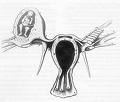Ectopic Pregnancy
An ectopic pregnancy is one in which the fertilized egg is implanted somewhere other than the uterus. More than 95% of these are in the fallopian tubes. It can also implant in the cervix, abdomen, or ovary so these are cervical, abdominal, or tubular pregnancies. The fetus has enzymes which allows it to implant in various tissues. After attaching, the fetus needs a significant blood flow and that is where the problems start, because of the tissue damage that can occur to the mother. Most of these occur in women 25-34 years old. The incidence grows dramatically for older women. It happens more than twice as much in women 35-39 and almost 6 fold in women over 40. Ectopic pregnancy, in Data from a 1992 study showed that in 108,800 cases showed just under 2% of pregnancies were tubular.

Since 1970, the rate has fallen off dramatically because of better testing methods and pregnancy ultrasound exams. African American teenagers have a mortality rate 5 times higher than white teenagers, probably because they tend to have fewer ultrasound tests.
If a urine test is positive or if you know your pregnant, a blood test will be given (Human Chorionic Gonadotropin or HCG) to test the hormone levels in the placenta. These hormones will double every 2 days in the first few weeks after conception. If the HCG levels come back a lot lower than expected, an ectopic pregnancy may be the cause. About 5 or 6 weeks in, an ultrasound in early pregnancy can show a fetus in the uterus, but if it is not there a mass will begin to show somewhere else.
Also see Molar pregnancy ultrasound
 Women who have had gonorrhea or chlamydia can have scarring in the uterus, cervix and fallopian tubes, which can be a reason for the egg not reaching the uterus. Inflammation can occur and bacteria, white blood cells, other fluids and puss can block the tubes while fighting the infection. After the body wins out over the infection, scars can occur. This can cause complications or even infertility.
Women who have had gonorrhea or chlamydia can have scarring in the uterus, cervix and fallopian tubes, which can be a reason for the egg not reaching the uterus. Inflammation can occur and bacteria, white blood cells, other fluids and puss can block the tubes while fighting the infection. After the body wins out over the infection, scars can occur. This can cause complications or even infertility.
Signs include cramping and, or pain in the abdomen, pain while urinating, vaginal bleeding, caused by falling levels of progesterone from the corpus luteum and can seem the same as bleeding from a miscarriage. Pain during a bowel movement is also a symptom. As always, you should see a doctor as soon as possible if you experience any of these signs. Other topics related to
ectopic pregnancy include vaginal ultrasound.
and
ultrasound safety
Back to Pregnancy ultrasound
Genesis pregnancy ultrasound machine Home Page
Thanks too:
Verena T Valley, MD, Associate Professor, Director of Ultrasound, Department of Emergency Medicine, University of Mississippi School of Medicine;
Larissa Hirsch, MD
wikipedia
Medical disclaimer




